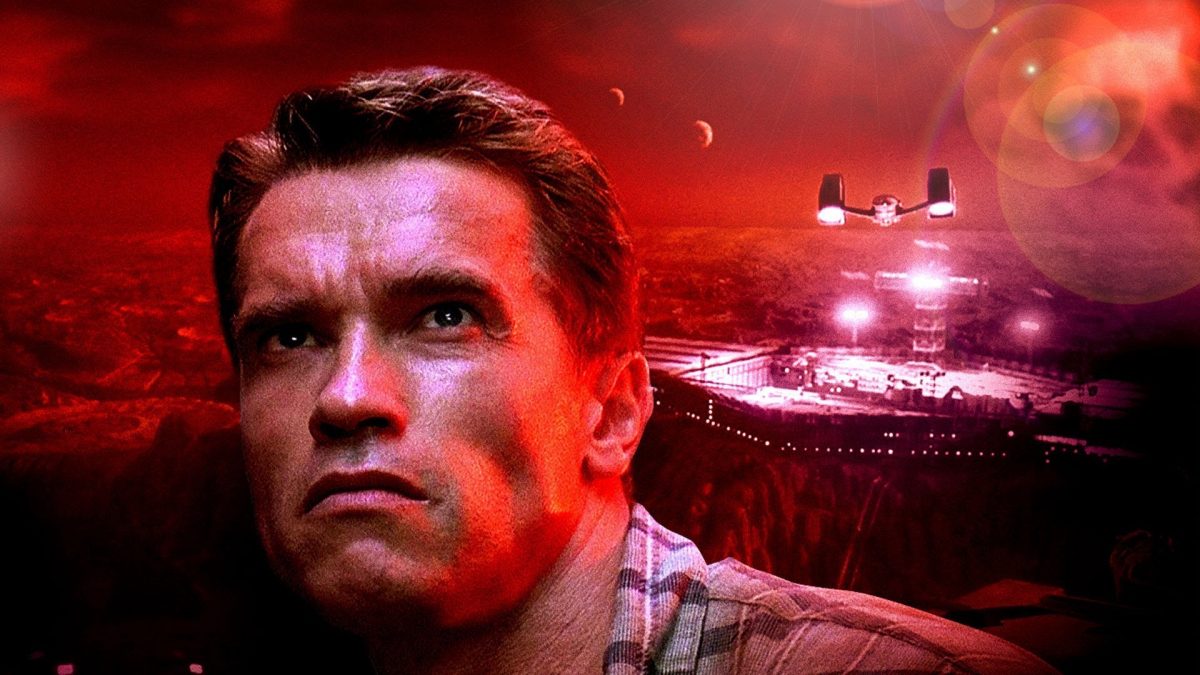Total Recall

Paul Verhoeven
USA – 1990

Screenplay: Jon Povill, Ronald Shusett, Dan O’Bannon, Gary Goldman
Cinematography: Jost Vacano
Production: Carolco Pictures Carolco International N.V.
Language: English
Duration: 113 min
Color: Color
Synopsis: Year 2084. For the busy Earthbound worker on a budget, Rekall inc. furnishes memories of exotic locations and adventure travel that feels like the real thing: recall all of the fun experiences without leaving home, for a fraction of the price! Douglas Quaid has been having nightmares about the planet Mars and has become so obsessed that he just has to visit, even if only via Rekall’s procedure. But when he is implanted with the false memories it all goes terribly wrong because, in fact, he has really been on Mars as Hauser, a double agent for the Marsian colony’s cruel administrator, Cohaggen. Undercover among the proletarian rebel-mutants, Houser/Quaid had met and fallen in love with Melina, a woman who revealed to him the dangers of corporate dictatorship went before his memories were erased by Cohaggen and replaced with those of a commonplace citizen. To defeat Cohaagen and save the people of the Red planet, Quaid now has to unlock the details of his former life with the help of the psychic mutant revolutionary leader Kuato. But reality is constantly in question. Is any of this genuine experience or is it Rekall?
Notes: Paul Verhoeven has been criticized for the mixed messages his films seem to send, for the sort of irresolution that may be a strange byproduct of what French cultural theorist Paul Virilio calls “cinematic derealization:” the dissolution of reality into cinematic fiction. The much lambasted Showgirls (1996), for example, by turns titillates with its inside glimpses of Las Vegas’s elaborate efforts to turn sex into a show and sends up that same sex culture. As a result, the film at times seems to exploit its female star Elizabeth Berkley in ways that are not much different from the reality in Las Vegas casinos and the porn industry. Likewise, Total Recall (1990) offered a protagonist who might be either a revolutionary working to help the underground on Mars against a repressive corporate dictator, or a plant by that same leader, put in position to betray the underground. Yet the film also avoided a neat resolution, for even as the ambiguous figure of Quaid/Hauser triumphs, freeing himself from Cohaagen’s control, restoring an atmosphere to Mars, and liberating the oppressed – doing all we expect from and even enjoy in the typical action/adventure film – he also suddenly questions the entire narrative: “What if this is a dream?” That qualm is fitting not only in the context of the film’s subplot about a company that can implant any sort of dream we might desire – the ultimate extension of both the film industry’s ideological work and the propaganda arm of the war industry (“false consciousness,” to borrow from Marx) – but also in the context of Verhoeven’s repeated blurring of distinctions between dream and reality. Verhoeven’s films often evoke contradictory political extremes that allow multiple interpretations without attempting to resolve them. That irresolution comes into sharp focus in Starship Troopers. As in Verhoeven’s other films, this work, on one level, is your typical sci-fi movie for those who like their action pumping and their special effects ‘boom’; yet at the same time, it has also been criticized on these same grounds, for pushing the action/adventure model to an extreme. This hesitation between something that is to be expected and something that is extreme is at the core of the notion of “cinematic delealization:” our sense of reality has become conditioned by cinematic effects and our ability to decide between what is an isn’t ‘realistic’.
One key to understanding Verhoeven’s work is to notice his focus on the media and how it serves Virilio’s “derealizing” function, particularly in the science fiction context. Verhoeven’s films frequently feature broad media satire, first seen in Robocop (1987), that underscores the deception and self-interestedness of the government and the mass media (network news) with which it is in active collusion. In the thoroughly mediatized world of Total Recall, the televisual screens, the privileged metonym of the mass electronic media, haunt every frame, re-framing the composition, cluttering the mise-en-scène like so many black mirrors. Not surprisingly, the net effect of this foregrounding of the televisual apparatus in the film is an implicit demonization of the technology in question, but points also to the extraordinary mediatization of the political sphere that had begun in the Reagan era. Total Recall captures this mediatic shift in a striking condensation: the shift of the politician as a benign “Father of the Republic,” turning into to the politician (Cohaagen) as a malignant media-“populist” embodiment of old-fangled authoritarianism – a shift that continues to develop in the heavily mediated mainstream political surrealism of 2016.
Notes based on Telotte, J.P. “Verhoeven, Virilio, and ‘cinematic derealization’.” Film Quarterly 53, no. 2 (2000 1999): 30. and Miklitsch, Robert. “Total Recall: Production, Revolution, Simulation-Alienation Effect.” Camera Obscura no. 32 (September 1993): 4-40.


